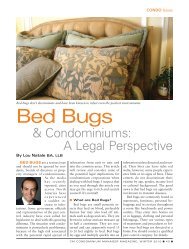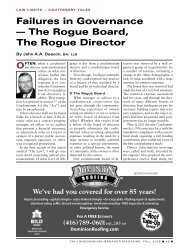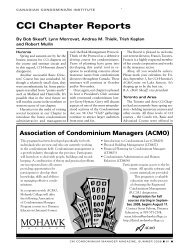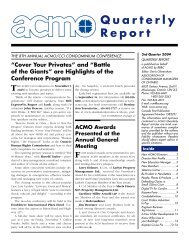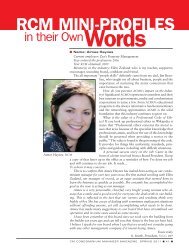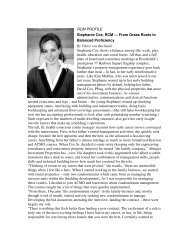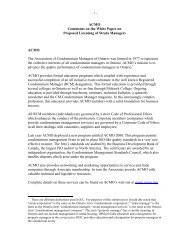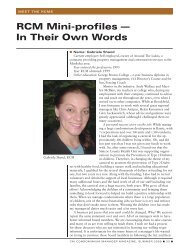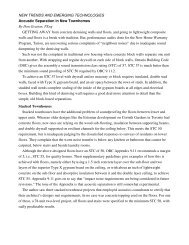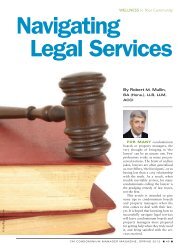Richard Pearlstein - Association of Condominium Managers of Ontario
Richard Pearlstein - Association of Condominium Managers of Ontario
Richard Pearlstein - Association of Condominium Managers of Ontario
You also want an ePaper? Increase the reach of your titles
YUMPU automatically turns print PDFs into web optimized ePapers that Google loves.
RCM PROFILE — RICHARD PEARLSTEIN<br />
Think Your Way to Success<br />
By Viktor von Buchstab<br />
Enthusiasm may be the first important contribution<br />
<strong>Richard</strong> <strong>Pearlstein</strong> brings to the table. Other<br />
abilities include a lean, healthy, trim persona,<br />
which leads to an appreciation <strong>of</strong> his pr<strong>of</strong>essional<br />
outlook on business matters. The founder <strong>of</strong><br />
Northcan Property Management Inc. shows a track<br />
record <strong>of</strong> developing lean, healthy, trim practices<br />
in the condominium properties <strong>of</strong> the management<br />
company. Along the way, the Northcan president<br />
also demonstrates a keen understanding <strong>of</strong> building<br />
mechanicals, and a grasp <strong>of</strong> financial implications<br />
reinforced by intense focus on fiscal matters – and<br />
even teaching pertinent ACMO courses.<br />
Like many property managers interviewed in this<br />
series, <strong>Richard</strong> <strong>Pearlstein</strong> didn’t set out to study<br />
property management. He studied chemistry and planned to be a research chemist after<br />
university graduation in the 1970s – around the time the first condominium corporations<br />
were being spawned. (He noted, during summer jobs, his peers-to-be – chemists with<br />
Masters degrees and doctorates washing test tubes and performing other menial tasks<br />
considering their training. His view <strong>of</strong> the future dimmed further on discovering these<br />
highly credentialed scientists earned appallingly modest salaries – adequate for a basic<br />
graduate, but not exciting for anyone with some financial ambitions.)<br />
Having learned at university how to teach himself a lot <strong>of</strong> arcane lore via reading, he took<br />
a flexible stance in his job searches and, when an opportunity presented itself in a large<br />
complex <strong>of</strong> rental buildings, he promptly became introduced to the property management<br />
business. But not as a property manager – yet. As superintendent, he learned the<br />
awesome spectrum <strong>of</strong> mechanical and related topics that is part <strong>of</strong> a property manager’s<br />
skillset and, in short order, he became maintenance supervisor, assistant property<br />
manager and then property manager. Young <strong>Richard</strong> <strong>Pearlstein</strong>’s academic experience<br />
hardly pointed to building management, but he demonstrated an unusual ability to learn<br />
new things – <strong>of</strong> any complexity. During this era, he found his buildings sold to other<br />
enterprises; he went with the buildings. When the owners changed, a long-time colleague<br />
and mentor told him, “DEL is looking for people.” In the fast-growth setting <strong>of</strong> the early<br />
’70s, DEL Property Management (Tridel at the time) needed people to run their<br />
buildings. He became intrigued at this “thing” called condominium.<br />
<strong>Condominium</strong> Management<br />
One day, Ray Cullen, his boss at Tridel, pointed out to <strong>Richard</strong> how fast the condo<br />
phenomenon was developing and suggested condo management. He had observed how<br />
buildings were constructed and studied <strong>Condominium</strong> Management at Seneca College<br />
just as the first wave <strong>of</strong> condos became incorporated in droves. It made sense and, shortly<br />
thereafter, <strong>Pearlstein</strong> found himself as “Developer Property Manager” for new glamour
sites like Bridlewood (Finch and Warden) and the Skymark complex (at Finch Avenue<br />
and Don Mills Road). By now the ’70s were pretty well along, about 1977/78. As he<br />
grew in skill, experience and import, the fast-maturing condo manager found himself in<br />
the company <strong>of</strong> various condo management organizations, in a generally mutually<br />
satisfactory career setting. At that time he saw the <strong>Association</strong> <strong>of</strong> <strong>Condominium</strong><br />
<strong>Managers</strong> <strong>of</strong> <strong>Ontario</strong> formed; condo management education demand was answered by a<br />
fast-growing need for practical courses. ACMO committees formed to guide<br />
development <strong>of</strong> such courses; and <strong>Richard</strong>’s scope and experience grew steadily.<br />
His last stint was as an employee at Medhurst-Hogg (from 1982–85). At that time, the<br />
management firm had begun looking for ways <strong>of</strong> getting out <strong>of</strong> the condo management<br />
business. Along the way, an increasingly seasoned <strong>Richard</strong> <strong>Pearlstein</strong> had been<br />
developing some thoughts on his own about customizing management contracts –<br />
tailoring them to the needs <strong>of</strong> highly individualized condominium corporations and,<br />
above all, he observed how a number <strong>of</strong> management firms seemed to have difficulty<br />
making money in that business – and he had ideas on how to fix that, too. In the ensuing<br />
discussions, he inherited the Westwood contracts, which formed a viable core for his own<br />
new management firm, launched as Northcan now 20 years ago, on April 18.<br />
Now his customization ideas started into play. “No two condominiums are alike,” he<br />
finds. From that, he concluded there would be a ready market for management practices<br />
and contracts that recognized such individual idiosyncrasies, and he set out to deliver<br />
such varied types and levels <strong>of</strong> service as demanded by some <strong>of</strong> the emerging condo<br />
corporations. Again, his astute accounting focus found a place to inject custom pricing<br />
for custom needs, and he finds a number <strong>of</strong> these sites are ready to pay for the focused<br />
services they require.<br />
Today, Northcan has some two dozen corporations in its portfolio and, with an expanding<br />
residential construction industry, seems set to continue <strong>Pearlstein</strong>’s growth into the<br />
future. The Northcan head confirms he’s always on the lookout for new technology and<br />
has a keen interest in the latest computer hardware and programmes. “Communication is<br />
a big part <strong>of</strong> this business and to remain competitive we must stay on top <strong>of</strong> advances in<br />
technology.”<br />
Giving Some Back<br />
Throughout this study <strong>of</strong> <strong>Richard</strong> <strong>Pearlstein</strong>’s pr<strong>of</strong>essional development, we’ve not<br />
discussed his ready embrace <strong>of</strong> volunteer activities and other extensions to his property<br />
management career. Long before his thoughts turned to forming his own management<br />
company, <strong>Richard</strong> found he enjoyed interacting with other pr<strong>of</strong>essionals on various<br />
ACMO boards, notably those charged with member education and other pr<strong>of</strong>essional<br />
development activities. Here he found it fruitful to share thoughts with kindred souls,<br />
typically committee heads, members, or those developing property management courses,<br />
principles and regulations, including a number <strong>of</strong> ACMO presidents. Shortly after he<br />
founded his own company, one <strong>of</strong> these mentors suggested he might want to volunteer to<br />
run for the Board himself and that put him in charge <strong>of</strong> the education committee for a<br />
term or two.<br />
As noted, the fast-maturing condominium management pr<strong>of</strong>essional now chose to share<br />
some <strong>of</strong> his wisdom more formally in course classrooms so we asked him about the<br />
rewards <strong>of</strong> volunteerism, why he decided to extend the stress <strong>of</strong> a high-pressure<br />
management career further into spare-time class settings, etc. In a two-part answer, the
Northcan founder explained about the wonders <strong>of</strong> interacting with the fellow<br />
pr<strong>of</strong>essionals in such activities where everyone goes that extra mile – conferencing with<br />
ACMO presidents, former presidents, presidents-to-be and the spectrum <strong>of</strong> highperformance<br />
property management pros who shaped the future <strong>of</strong> the industry. (<strong>Pearlstein</strong><br />
himself was ACMO president in the early ’90s.) He added further views about the more<br />
pragmatic and less altruistic aspects <strong>of</strong> the volunteer circuit, acknowledging the obvious<br />
and implied value <strong>of</strong> liaison with industry peers – fellow seminar leaders, fellow<br />
committee members, former and future business associates, as well as those important<br />
contacts that lead to the referrals that help portfolio growth.<br />
“I really enjoyed the camaraderie,” he reflects. “I enjoyed the fellowship <strong>of</strong> working in<br />
the [ACMO] association, with the right group <strong>of</strong> people. It’s a great organization and,<br />
really, that’s what drove me. I enjoyed the participation. I enjoyed the volunteerism. I<br />
enjoyed the social interaction.” <strong>Pearlstein</strong> recognizes there may have been some loss <strong>of</strong><br />
the “club-atmosphere” that characterized the condo management industry <strong>of</strong> the ’80s, but<br />
as the industry matures he emphasizes the ongoing benefits <strong>of</strong> such pr<strong>of</strong>essional<br />
associations and interacting with them.<br />
<strong>Pearlstein</strong> further emphasized the joys <strong>of</strong> teaching – helping form and guide the minds <strong>of</strong><br />
both young and mature students entering the field, and enjoying the satisfaction <strong>of</strong><br />
helping pave the path <strong>of</strong> those future careers. He himself was drawn into this area “by my<br />
own criticism” somewhat unexpectedly, back in 1984, when he finally got down to<br />
writing his own RCM exam. After the exam, the Education Chairman, Bob St. George,<br />
asked what he thought <strong>of</strong> the tests themselves, and <strong>Richard</strong> politely suggested some <strong>of</strong><br />
the questions were found wanting – perhaps needing rewording, or even refocusing on<br />
more pertinent aspects. To his credit, the instructor took the feedback seriously and told<br />
<strong>Richard</strong>, “Thank you for volunteering. You’re on the RCM committee!” And <strong>Richard</strong><br />
took his new chores just as seriously, amending and extending the test questions for this<br />
course and other property management-related learning.<br />
Peers + Mentors<br />
<strong>Richard</strong> agrees such a receptive mindset was also conducive to involving him in the test<br />
refinement process, and he found such an open invitation suggested his feedback would<br />
be appreciated – as distinct from some teachers who ask for students’ “opinion” on a<br />
subject, when all they want is parrot-style feedback devoid <strong>of</strong> originality. <strong>Pearlstein</strong><br />
recognized a sincere invitation to participate in the refining <strong>of</strong> the RCM tests and set to<br />
work in the volunteer context with such open minds. “That drove me,” he recalls. “If I<br />
felt I really wanted to make a contribution, and ran up against an obstructionist ego,<br />
obviously I would have backed <strong>of</strong>f.” He’s maintained a good business relationship with<br />
his former directors and others he met in the academic circuit ever since.<br />
We can see from <strong>Richard</strong> <strong>Pearlstein</strong>’s perspective, he puts a high premium on<br />
condominium managers’ ability to comprehend the complexities <strong>of</strong> the property<br />
management existence, and that all-important skill (or gift) the ability to think. When we<br />
ask <strong>Richard</strong> how he got so good at the condo management role, he credits his father with<br />
sensitizing him to this latter point, giving him one, important, monosyllabic piece <strong>of</strong><br />
advice, “Think!” way back in the beginnings <strong>of</strong> his son’s management career. And<br />
<strong>Richard</strong> took the advice to heart, thinking about the niceties <strong>of</strong> managing other people’s<br />
real-estate investments; and he takes the thinking ideology a step further in his<br />
enthusiastic support <strong>of</strong> activities that train other managers to become more pr<strong>of</strong>icient at
their work. “I learned some additional teaching skills at Humber College,” he elaborates,<br />
since he recognizes it’s not just a matter <strong>of</strong> telling junior managers to “think,” but to<br />
share with them techniques and experiences to help them manage better, and in a more<br />
pertinent way about the daily details <strong>of</strong> optimizing the performance <strong>of</strong> the real estate<br />
under their management.<br />
That’s how he himself developed his management skills – under the tutorial wing <strong>of</strong> a<br />
seasoned industry pro – in this case, one André Pillish (then a senior manager at DEL).<br />
“He was instrumental in my becoming a condominium property manager,” <strong>Richard</strong><br />
remembers. “There’s a guy who was really hands-on. In my formative years, he showed<br />
me how to write management reports, how to be proactive, how to stay on top <strong>of</strong> things.<br />
He kept me on my toes, so I would always be on top!”<br />
Talking with <strong>Richard</strong> <strong>Pearlstein</strong>, it becomes strongly apparent he holds a deep respect for<br />
his fellow property management pr<strong>of</strong>essionals; and this is one <strong>of</strong> the attractions that<br />
changed his own view <strong>of</strong> property management from a job to a career. Going back to his<br />
more humble beginnings, when he transitioned from superintendent and maintenance<br />
supervisor into his first, true property management position, he muses how he was<br />
“grossly overworked and underpaid.” To some extent, he feels this is the nature <strong>of</strong> the<br />
business, as it is composed <strong>of</strong> higher-than-normal percentages <strong>of</strong> individual managers<br />
who display exceptional performance in their daily activities; and it may be that this is<br />
part <strong>of</strong> the charm, or charisma, <strong>of</strong> condo management: the people you rub shoulders with<br />
– the people who think, and with whom he enjoys interacting. “The problem with this<br />
industry, this job, is that talented people are rarely recognized or highly valued. The<br />
people I know in this industry are extremely talented in so many, many ways. They have<br />
computer skills; they have technical skills; they have writing skills; they have<br />
organizational skills, they have people skills. All <strong>of</strong> those skills are available, and all <strong>of</strong><br />
those skills are there....are they truly appreciated? <strong>Condominium</strong> management attracts<br />
talent.”<br />
*<br />
Viktor von Buchstab is a freelance writer based in Toronto.<br />
* <strong>Condominium</strong> Manager Magazine – Spring 2005



